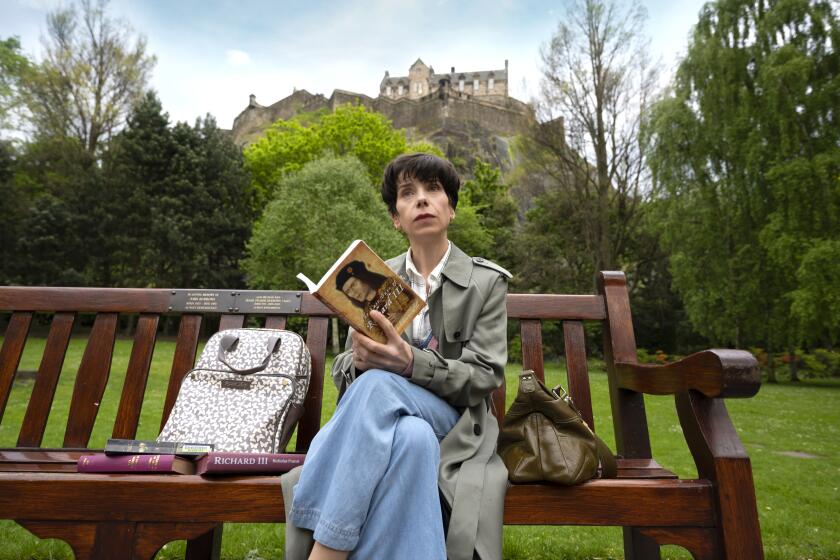Review: Finding oneself in a challenging search for ‘The Lost King’

- Share via
Fact, fiction and feeling collide and combine in Stephen Frears’ “The Lost King,” written by Steve Coogan and Jeff Pope, an adaptation of the book “The Lost King: The Search for Richard III.” This unique and lively mystery based on a true story comes from the team behind the Oscar-nominated “Philomena,” and it takes much the same approach, centering the story of a British woman embarking on a nigh-impossible search for a man, assisted in some way by a kind, yet put-upon, Coogan.
While Judi Dench’s Philomena sought her long-lost son, Sally Hawkins’ Philippa Langley seeks a long-lost king, Richard III, trapped in the amber of our collective imaginations as the titular evil antihero of Shakespeare’s play. Philippa, a middle-aged woman in Edinburgh with two boys, a faltering marriage to John (Coogan), a dead-end sales job and a challenging diagnosis of ME/CFS (otherwise known as chronic fatigue syndrome), becomes inspired by the story of Richard III at a production of the play she has to attend for her son’s school.
For your safety
The Times is committed to reviewing theatrical film releases during the COVID-19 pandemic. Because moviegoing carries risks during this time, we remind readers to follow health and safety guidelines as outlined by the CDC and local health officials.
Struggling to be taken seriously at home and work despite her physical condition, she relates to Richard’s struggle with his own disability (his “hunchback”), and objects to his villainous depiction. Philippa sets out to discover the truth about Richard’s life and story, embarking on a research journey that lands her in a car park in Leicester, England, uncovering and rewriting history with her own intuition.
It’s an inspiring story of personal determination as Philippa meets obstacles at every step, from a lack of funding to folks who simply don’t believe her or object to her reliance on gut feeling. Frears animates her journey with crisp, beautiful cinematography by Zac Nicholson, who frequently captures Philippa in aerial shots as she crosses the ancient squares of Edinburgh and Leicester, foreshadowing the maps of her future archaeological dig. A sprightly score by Alexandre Desplat, riffing on Bernard Herrmann, offers a whimsical, almost Hitchcockian sense of suspense to the drama, as big musical cues signify important moments, such as when Philippa is overcome with emotion as she stands on a giant “R” painted in the car park.

Frears anthropomorphizes Philippa’s otherworldly intuition by granting her a literal spirit guide in the form of a taciturn Richard III “apparition,” played by the actor (Harry Lloyd) who initially sparked her interest onstage. He pops up from time to time, encouraging Philippa to keep going and that she’s on the right path in her quest to lay the king to rest.
Toward the end, “The Lost King” reveals a distinctly British obsession with royalty and propriety that doesn’t always translate with the same reverence abroad. But the more important story being told is the one about discrimination and misinformation; that fact can be twisted into fiction that’s perpetrated for centuries. Philippa’s mission to ensure Richard III’s royal coat of arms on his tomb might seem a bit superfluous, but for her, it’s about restoring the truth, not necessarily the title.
The film reconstructs the search and discovery of Richard’s remains by Philippa Langley, played by Sally Hawkins, which was nearly erased when a U.K. university took credit for the discovery.
Believing that Richard’s scoliosis allowed his rivals to characterize him as monstrous, Philippa’s mission as a Ricardian is to emphasize his humanity over the politically motivated “fake news” of the day that became Shakespearean fiction and was eventually cemented as common knowledge. It’s a film that calls into question our own biases and accepted notions and encourages one to get out there and find the truth — it could be an adventure after all.
Katie Walsh is a Tribune News Service film critic.
‘The Lost King’
Rated: PG-13, for some strong language and brief suggestive references
Running time: 1 hour, 48 minutes
Playing: Starts March 24 in general release.
More to Read
Only good movies
Get the Indie Focus newsletter, Mark Olsen's weekly guide to the world of cinema.
You may occasionally receive promotional content from the Los Angeles Times.











